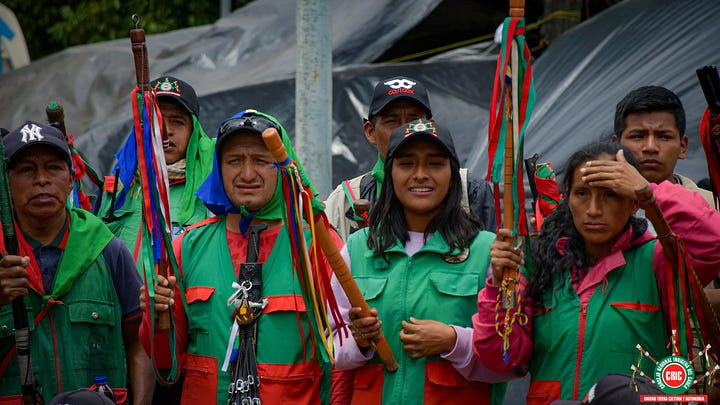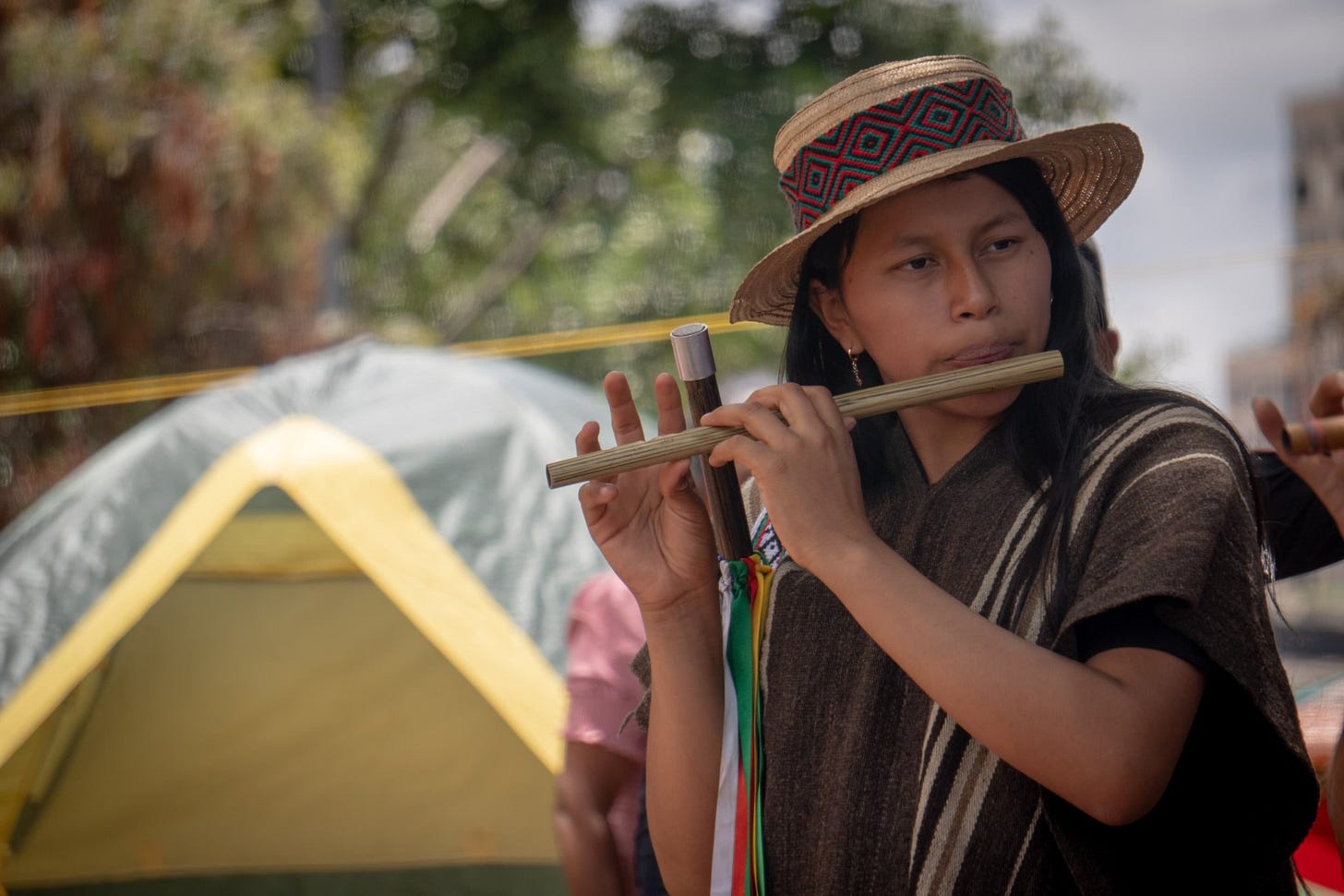From Cauca, Colombia a fierce “cry of resistance”
As violence in their communities escalates, Indigenous and Afro-Colombian residents demand action from Petro

“We’ve canceled the visits to the communities in northern Cauca,” the security liaison told me after I’d flown to Cali to meet him. “There is an ‘armed strike’ in San Juan,” he said, referring to a tactic armed groups often use to confine communities to their homes either as a display of power or before launching attacks against other criminal groups in the region.
Violence in Cauca is skyrocketing, and residents, many of whom supported leftist president Gustavo Petro in elections in 2022, feel they have been abandoned by a government that only seems to care about them when election season rolls around.
“Also, with the collapse of the ELN ceasefire, we’re expecting confrontations between them and Mordisco’s boys”, he continued, using a nickname some experts in the region use to refer to Estado Mayor Central (EMC), a FARC dissident group led by Iván Mordisco that doesn’t acknowledge the 2016 peace deal with the government.
My stomach sank in disappointment. I had been invited to northern Cauca, Colombia, by an NGO called PLAN, which promised to take me to some of the communities where they do their peacebuilding work. I always jump at opportunities to visit Cauca. Not only is it one of my principal beats, being one of the principal areas of ongoing conflict in Colombia, I deeply love and respect the people.
Most residents in Cauca have long been effectively abandoned by politicians in Bogotá and live in the shadows of a low-intensity conflict for over half a century. Despite the adverse material and social conditions they face, however, they are a model of “resistencia” and peace-building in effectively stateless and conflict-torn regions of the biggest drug transportation corridor in South America, and perhaps the world.
At the same moment I was arguing with the NGO security liaison in Valle de Cauca, a massive indigenous caravan of indigenous protesters from the Cauca region was camped in Bogotá, staging marches and protests over rising violence against their communities.
A “minga”, a collective protest from dozens of affected communities that had traveled from Cacua to the capital was demanding an audience with President Gustavo Petro
As we’ve covered extensively at PWS, leftist president Gustavo Petro, promised to bring “Total Peace” to the country via negotiation with armed groups. Despite progress at the negotiating table with some armed groups, the ceasefires with Colombia’s largest armed groups have collapsed— most recently with the National Liberation Army (ELN), the largest remaining rebel group in the country.


Making the scenario even more complicated, a spike in attacks committed by EMC, particularly against Indigenous communities, led to an angered President Petro demanding “Total War” against the group instead of “Total Peace”. A military offensive was launched by state forces soon after that includes the use of aircraft and artillery, and EMC has responded with hundreds of asymmetrical attacks against security forces in response.
Ana, who asked that her last name not be published for personal safety reasons, is an Afro-Colombian resident of Buenos Aires, a small community in northern Cauca. “The word ‘resistance’, to us, has a very specific meaning,” she told PWS in Cali, where we spoke about grassroots peacebuilding efforts in her town. “It doesn’t mean just enduring as victims, it means building structures to be active protagonists against oppressive structures, be they state or criminal.”
She explained how her community has heard promises from Bogotá for decades, promises which are almost always broken. “It’s taught us that we must rely on ourselves above all,” she said. “and that resistance can be physical, cultural, or any other form that helps us. We will not be silenced.”
The cost of Petro’s failed ceasefire policies — and the increasing violence for residents in Cauca— has been brutal. The homicide rate per 100,000 people in Cauca was 56.1 in 2023, more than in Ecuador and Haiti. This year is likely to be even higher.
Indigenous peoples, who make up nearly 25% of the population of Cauca — 6 times the percentage nationally (4.28%) — have long struggled not only against criminal armed groups
but also against attempts by corporations and wealthy landowners to seize their ancestral lands. Some of those land grabs were organized or at least shielded by the very same politicians in Bogotá who have failed to protect them.
Cauca’s Afro-Colombian population is also 4 times higher than the national average, at just under 20%, compared to 4% nationally. “Marginalized” is the official term for these communities, but that word, often thrown around at conferences and political events, fails to encompass the adverse conditions faced by some communities in Cauca.
Armed groups impose terror on civilian populations in the form of extortion, forced recruitment, and “toque de quedas” in which communities are trapped in their homes under threats of violence, checkpoints, and even bombings.
Meanwhile, the national government, across administrations, has done little to help them, or even invest in infrastructure in their communities.
The “Minga” in Bogotá, amidst ongoing protests, responded to an offer by the government on Saturday, August 31 that seems intended to lower tension in the capital. Though Petro still hasn’t met with Minga leaders, protesters have been in talks with representatives from the government. According to public statements by Petro, the law package he is offering Indigenous protesters “strengthens governance and the special jurisdiction of Indigenous peoples.”
The CRIC, the indigenous council of indigenous peoples in Cauca, responded in public statements that while they “welcome” increased jurisdiction of their own lands, “the focus must not waver from ongoing violence in Cauca against indigenous and Afro-Colombian communities.”
The CRIC agreed to sign the agreement, however, and on Saturday announced communities would return to Cauca this week. Whether the agreement improves conditions on the ground for marginalized communities remains to be seen.
For Ana, “We’ve heard these promises before. I don’t trust politicians in Bogotá to keep their word,” she said. “In the meantime, our fierce cries of resistance continue.”

The Big Headlines in LATAM
Twitter (X) went offline in Brazil on Friday after an order by Judge Alexandre de Moraes who made the decision this week after Elon Musk refused to appoint a legal representative in the country or pay outstanding fines.
Musk and the Brazilian judge have been feuding since April after the Moraes ordered the suspension of some accounts supporting former President Jair Bolsonar for spreading disinformation.
Earlier this week Musk fired his entire Brazilian staff, and in public comments announced he would not obey Moraes’ order. In a public statement, Musk wrote "Free speech is the bedrock of democracy and an unelected pseudo-judge in Brazil is destroying it for political purposes."
Moraes also ordered the suspension of Starlink bank accounts in the country, another Musk-owned company, which is a subsidiary of SpaceX.
Venezuela suffered a series of rolling national blackouts on Friday. The government blamed the outages on “electronic attacks” from the United States and opposition politicians. They did not provide proof of the accusations.
Since the country’s July 28 election results were disputed by the international community, security forces have arrested thousands. Experts predict another 100,000 people may flee the country in the coming weeks and months.
Ship’s Log
Joshua, obviously, is freshly returned from Cauca. Back in Med, where he is staying with fellow pirate and sometimes PWS contributor Adrian Anselm. He’d like to return to Cauca soon, but this time get into the nitty-gritty of the communities we spoke about this week.
That’s probably easier without the NGO security protocols, so making it happen in the near future seems highly likely. Daniela is also about to head to Medellin for a couple of stories at El Pais. They’re pitching that crazy mining story we wrote about last week, but so far no bites.
Even after all these years of freelancing, sometimes it confuses us which stories media companies are interested in, and which they aren’t. But hey, that’s why we started PWS. The Goodship Capybara sails on!
Spanish Word of the Week
Ahogarse en un vaso de agua - to drown oneself in a glass of water
Whereas English-speaking people can sometimes make mountains out of molehills, Spanish speakers are more dramatic. When someone gets too worked up over a minor problem or comes up with a complex solution to a simple situation, they are “drowning themselves in a glass of water”.
Molehills seem less dangerous.
Hasta pronto, piratas!



Cauca is my motherland!!! ❤️❤️❤️